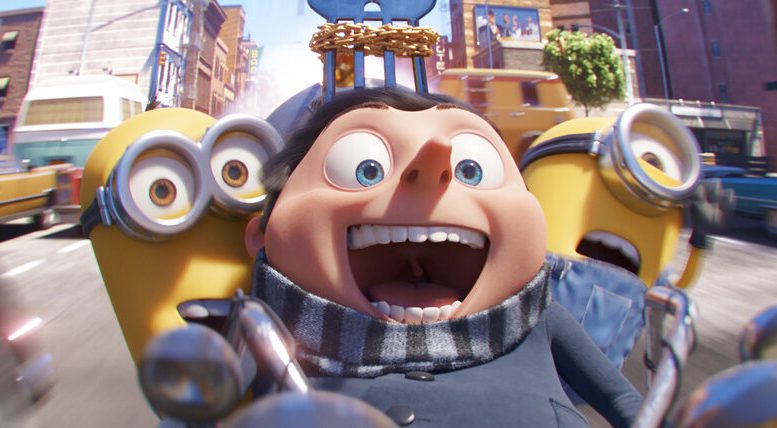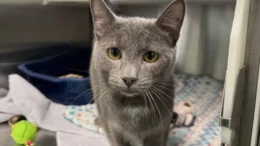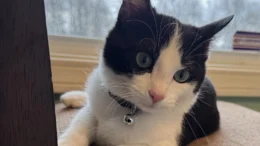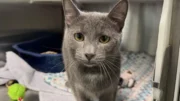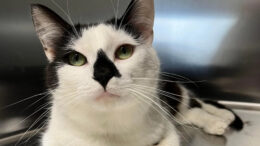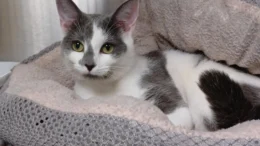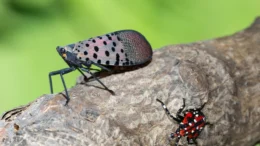NEW YORK (AP) — Some of the movies’ biggest stars barely speak a word of English, or any other language for that matter. Sure, you can occasionally hear them say “Banana!” or possibly “Smoochy smoochy!” but most of what they say is gibberish. The Minions may be the world’s most popular, and lucrative, foreign language movie stars — even if “Minionese” isn’t an officially recognized language.
This summer, the goggle-wearing yellow ones will return yet again to further expand their sizable empire in “Minions: Rise of Gru” (in theaters July 1). The “Despicable Me” franchise (a fourth is due in 2024) and its “Minions” spinoffs already rank as the highest-grossing animated film franchise ever with more than $3.7 billion in tickets sold worldwide.
That’s a big reason why “Rise of Gru” was held back by Universal Pictures for the last two years during the pandemic. The Minions — a second-banana scene-stealing horde of mostly incompetent but fiercely loyal henchmen — have in 12 years become a formidable force and a ubiquitous culture presence.
“There’s a lot of them so they have a kind of power in that they can overwhelm,” says Chris Renaud, producer of “Rise of Gru” and director of the first two “Despicable Me” movies. “It’s like power by wearing you out.”
“There’s a paradox about them,” says Kyle Balda, director of “Rise of Gru,” “Minions” and “Despicable Me 3.” “They want to serve an evil boss of some sort yet there’s nothing evil about them, really. They’re quite good-natured except they like to see others fail a little bit. They laugh at each other’s misfortune. They’re very flawed, but their flaws end up working out for them. One of the things we often say is: They fail upward.”
Failing upward has gotten the Minions very far, indeed, especially considering how close they came to never quite clicking in the first place. When the filmmakers and artists of the Paris-based animation studio Illumination were developing “Despicable Me,” the original script had them as “henchmen and technicians” and the early mock-ups drew them as hulking tough guys, almost Orc-like monsters.
Then they were cylindrically shaped robots. But the filmmakers — including Renaud, co-director Pierre Coffin, and art director Eric Guillon — kept playing with the concept, trying to channel the spirit of the Jawas in “Star Wars” or the Oompa Loompas in “Willy Wonka & the Chocolate Factory.” Since “Despicable Me” was based on Gru, the evildoing protagonist, the Minions needed to help balance him. If the Minions loved him, he could love the Minions.
“Pierre was the one who said ‘Maybe they shouldn’t be robots,’” recalls Renaud. “I said, ‘Well, what about mole people?’ And he goes, ‘I don’t know what that is.’ So I sent a couple ugly sketches to Pierre and Eric, and then Eric did a sketch that’s basically what you see you today. We were like, ‘OK, that looks like a pill with a goggle on it. That could work.’”
But what, exactly, were the Minions? Even their creators weren’t immediately sure. They pondered a wide range of ideas. Were they created in a lab by the movie’s gadget-maker, Dr. Nefario? The Minions were effectively blank slates, and the filmmakers could funnel just about any slapstick influence through them, from Charlie Chaplin to James Bond. A breakthrough, Renaud says, came while they were scripting a scene where the Minions craft Gru’s internet dating profile and “go full incompetent.”
That was when the “Despicable Me” filmmakers started to sense that they had hit on something potentially big — a truly cartoon creation with limitless possibilities. The Minions, wide-eyed and (mostly) innocent, were like kids.
“When we do design work, it’s like baby animals,” says Renaud. “Even if they’re behaving poorly, you forgive them and laugh at it, the way you would with your own kids.”
Just as key, too, was Coffin’s voicing of the Minions. Coffin has voiced (with the aid of pitch modulation) nearly all the minions in each film, spitting out half-words, onomatopoeias, and a grab bag of expressions from a wide spectrum of languages. If Coffin and the team had Indian food for lunch, the Minions would be shouting “Tikka Masala!” by dinner.
Because the Minions started out loosely defined, and their very nature a little mysterious, the franchise has offered them a chance to continually evolve. In 2015’s “Minions,” their backstory got filled in a little; a montage followed them through history and a long line of bosses, from a Tyrannosaurus rex to Napoleon — all of whom the Minions unwittingly sabotage. Some Minions — Kevin, Stewart, and Bob — have been isolated like a trio of siblings. “The Rise of Gru” picks up after they meet young Gru, who they call “mini-boss” even though he wants to be taken seriously as a villain.
“It’s sort of like a romantic comedy where it doesn’t all work out nicely in the beginning,” says Balda. “Boy meets girl, boy loses girl, boy gets girl back. But in this case, Gru is the girl because it’s the Minions who are really courting him.”
Family moviegoing fell considerably during the pandemic, during which several prominent films for kids went straight to streaming. But the recent box-office successes of films like “Sonic the Hedgehog 2” and “The Bad Guys” have suggested families are eager to return to theaters. There are other family-friendly movies heading to theaters this summer (most notably “Lightyear,” the first Pixar film to open theatrically in two years), but the Minions and “Rise of Gru” hope to help lead the way. A trailer for the film ends with the Minions, like children at the movies, filing into a theater and hopping into their seats.
Meanwhile, the work continues for the filmmakers to find out a little more about the juggernaut they created, and to keep coming up with new gags for the Minions. In “Rise of Gru,” they learn kung fu, a complication considering the size of their legs. Luckily, it’s not really even up to the filmmakers. The Minions are in charge.
Says Balda: “It’s almost like the Minions tell you what they want to do as you’re drawing them.”

